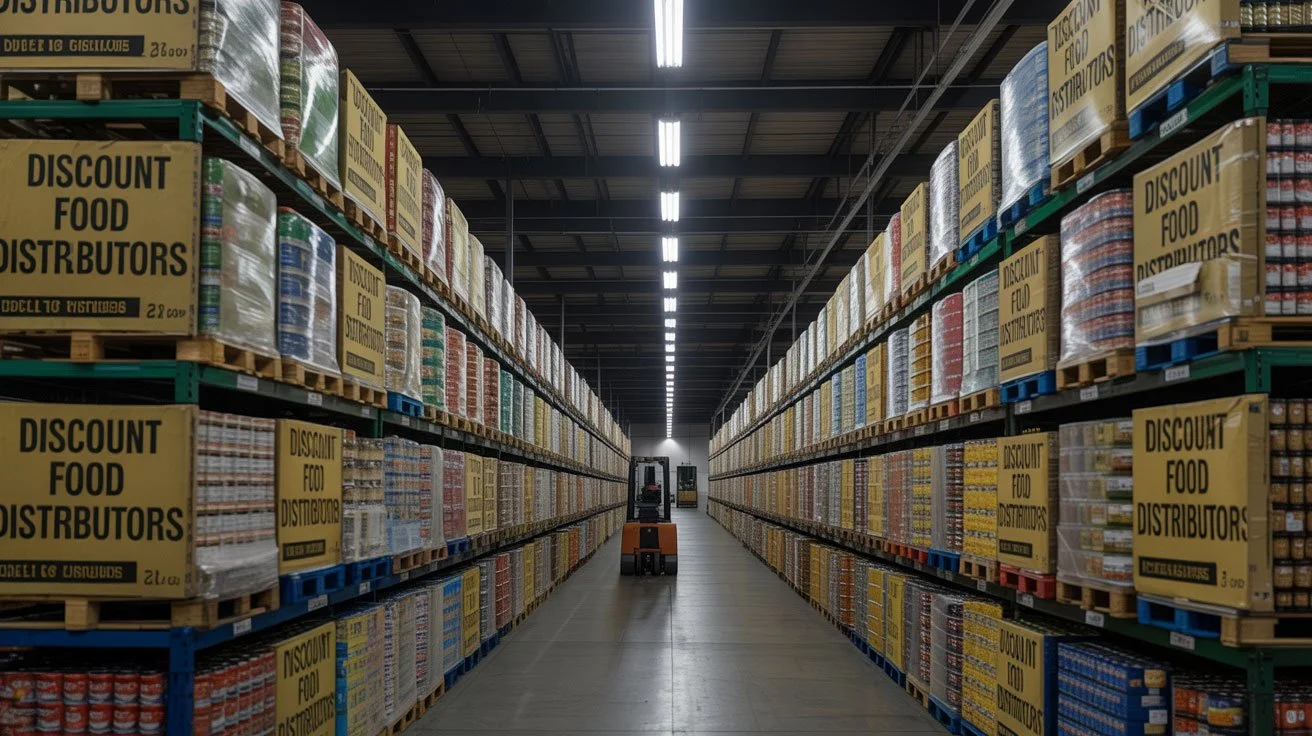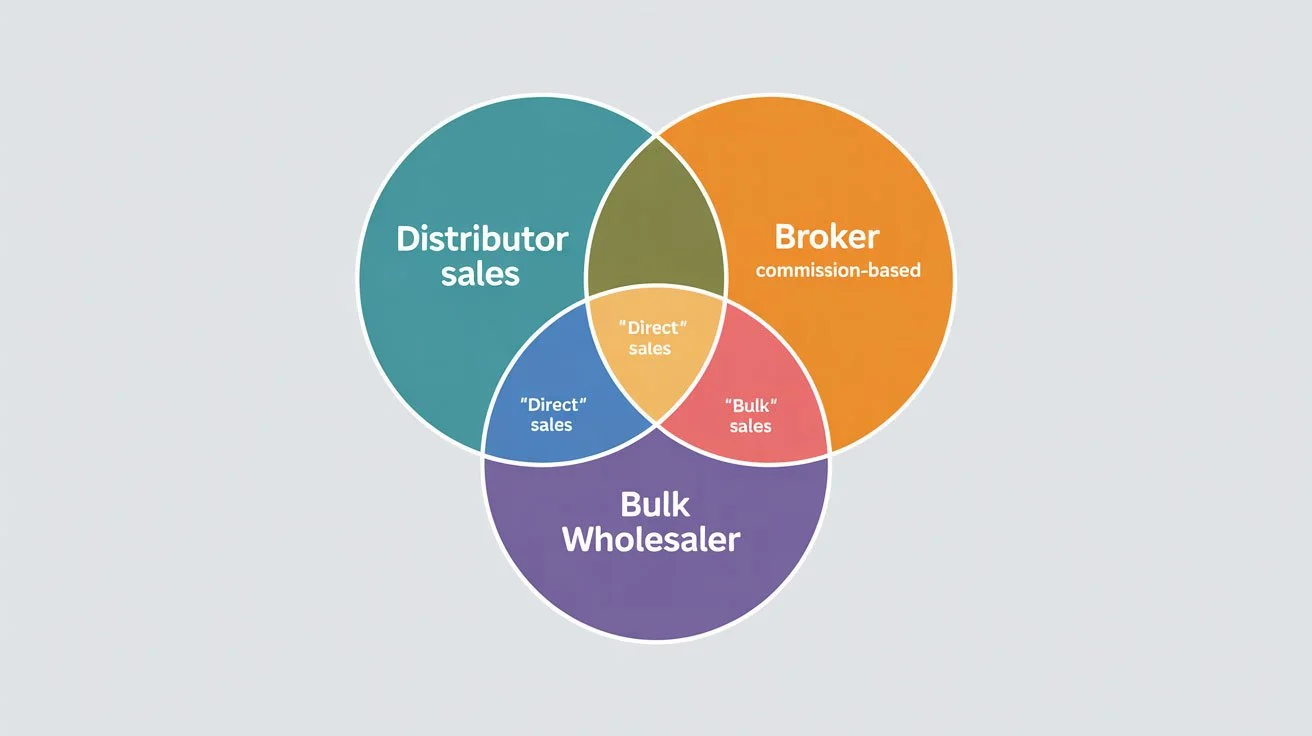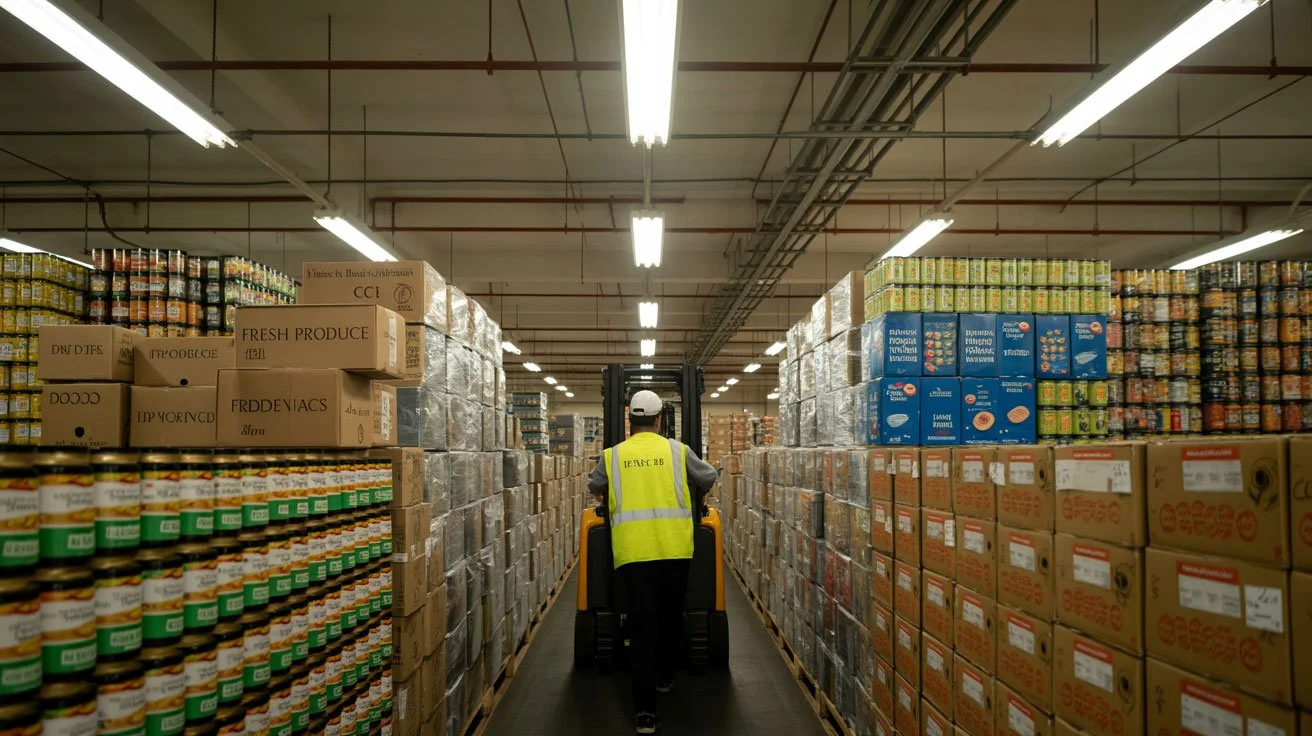The Ultimate Guide to Discount Food Distributors
Food prices are still rising, and not by a little. As of spring 2025, grocery inflation has reached a 3.4% year-over-year increase in the U.S., and the UK isn't far behind. Families are stretching their budgets thinner. Small retailers are hunting for smarter supply lines. Food programs and institutions are under pressure to feed more people with less money.
At the same time, the planet is drowning in surplus food. Roughly 2.5 billion tons of edible food is wasted globally each year. That’s one-third of all food produced, according to recent data from the Food Waste Index. Not expired. Not spoiled. Just unused.
This is the crossroads where necessity meets opportunity. And right in the middle of it all? Discount food distributors: the quiet workhorses of a food system that desperately needs both savings and sustainability. Whether you’re a buyer for a correctional kitchen, a discount retailer, or just a consumer hunting for “discount food near me,” these companies are changing the way food moves, one pallet at a time.
What Are Discount Food Distributors?
Discount food distributors are businesses that specialize in sourcing high-quality, brand-name food at reduced prices - often due to surplus, cosmetic packaging changes, short-coded shelf life, or discontinued product lines.
These aren’t expired leftovers or unwanted stock. In most cases, the products are fully safe, fully edible, and often indistinguishable from what's sold at full price on supermarket shelves.
So where does this food come from?
A cereal box with a misprint.
A pallet of pasta with branding that's being phased out.
Canned soup that’s within date but was overproduced for last quarter’s promotion.
Traditional retailers don’t have the room, speed, or systems to move that kind of inventory efficiently. But discount food distributors do.
These distributors step in, buy at bulk rates, and pass the savings on to buyers like:
Discount grocery chains
Independent stores
Food banks and nonprofits
Correctional facilities
Online bulk sellers
And the impact isn’t just economic. It’s environmental. Every pound of food diverted from landfills means lower methane emissions and less waste.
These companies are where fiscal pragmatism meets food rescue.
“Most people don’t realize how much perfectly good food never makes it to shelves. Our job is to change that fast.” Says Jamie.
The Types of Food Distributors
The food distribution industry is broader than many realize, and understanding the distinctions helps clarify why discount food distributors fill such a vital niche. Here's a breakdown of the major types:
1. Broadline Distributors
These are the big generalists. They sell everything from frozen foods to dry goods, typically to restaurants, schools, and healthcare institutions. They're convenient but rarely the cheapest.
2. Specialty Distributors
They focus on specific product categories. Those might include organic, gluten-free, or ethnic foods, often catering to niche markets or upscale retailers.
3. Redistributors
These are the middlemen’s middlemen. Redistributors buy in huge quantities and resell to smaller distributors, especially in regions where direct manufacturer relationships are rare.
4. Cash & Carry / Warehouse Outlets
Think of this as self-service distribution. Buyers go directly to a warehouse, purchase what they need (usually in bulk), and handle the transport themselves.
5. Discount Food Distributors
This category is distinct, and increasingly essential. They specialize in moving salvage, overstock, and closeout food products from warehouses to end-users who crave value. That includes schools, correctional programs, and regional grocers. It’s not about second-rate goods; it’s about giving good food a second chance.
Many discount food distributors also work with salvage food suppliers, food brokers, or directly with manufacturers to source unsold, perfectly edible inventory that would otherwise be discarded.
In short, they turn a supply chain bottleneck into a budget-friendly buffet.
Food Distributors vs Brokers vs Wholesalers
So how do food distributors differ from brokers and food wholesalers?
These terms are often tossed around like they mean the same thing, but in reality, they serve very different functions. Knowing which one you’re dealing with (or need) can mean the difference between slashed costs and logistical chaos.
Distributors
Distributors buy food products (often in bulk), store them in their own warehouses, and then resell those products to their customers, typically grocers, foodservice operations, or institutions. They often manage delivery, inventory turnover, and sometimes credit terms. Think of them as the “storehouse and supply chain.”
Discount food distributors are a specialized form of this. They focus on closeout or excess inventory and pass along big savings to buyers who can handle variable supply.
Scott says: ““We’re not just moving product. We’re connecting excess supply with urgent demand, that takes speed, trust, and a whole lot of hustle.”
Brokers
Food brokers don’t usually own or store the products. Instead, they act as connectors. They represent sellers, manufacturers, co-packers, importers, and link them with buyers. What makes brokers especially powerful in the discount food space is their ability to move product fast. Especially salvage, surplus, or time-sensitive inventory.
For example, SJ Food Brokers excels at this. They're not just flipping SKUs; they’re actively solving problems: clearing space in one warehouse while stocking up a prison kitchen in another.
Wholesalers
Wholesalers buy product from manufacturers and resell it, usually at a markup, to smaller retailers or foodservice operators. Their business model relies more on volume and price stability, which makes them less nimble when it comes to fast-turn salvage or surplus deals.
If you need flexible, affordable inventory fast, and you're OK with non-standard SKUs, discount food distributors and salvage food brokers are your go-to solution.
What Do Discount Food Distributors Actually Do?
Behind every dented can of beans or off-season holiday snack at your local discount store, there’s a machine at work, and that machine is a discount food distributor.
But what do they actually do all day?
1. Source Salvage or Overstock Inventory
They’re constantly scanning for excess goods, food that’s been discontinued, short-coded, mislabeled, overproduced, or simply left behind after a failed marketing push.
Example: A major brand cancels a spring promo, leaving 20,000 cases of limited-edition crackers sitting in a warehouse. A discount food distributor swoops in and negotiates a deal.
2. Vet for Safety and Compliance
Contrary to the myth, this isn’t some underground food trade. Everything must pass quality checks. Distributors work within USDA, FDA, or local guidelines to ensure products are legal, safe, and sellable.
3. Match the Product to the Right Buyer
This is where the real magic happens. A sharp distributor knows who needs what, and when. Is it a food pantry that needs canned soup for winter meals? A corrections system sourcing shelf-stable snacks? A discount chain prepping for holiday rush?
4. Handle Logistics
Freight, storage, drop dates, labeling, legal disclaimers – it’s all managed. And often fast. Inventory can move in days, not weeks.
This high-speed, high-impact model is why so many government programs, small grocers, and discount retailers rely on discount food distributors to stay stocked and profitable.
The Benefits of Working with Discount Food Distributors
This is the part where it all comes together. Yes, discount food distributors offer better prices. But the real reasons organizations stick with discount food brokers go far deeper.
1. Huge Cost Savings
We’re talking savings of 30% to 70% compared to conventional wholesale. For many clients, including food programs, correctional kitchens, or independent grocers, that delta is the difference between surviving and thriving.
“We were paying $5 more per case before SJ,” says Darren S., procurement manager for a correctional facility in Texas. “Now we feed more people and stay under budget.”
2. Waste Reduction You Can Feel Good About
When you work with salvage food distributors, you're helping fight back against the 120+ billion pounds of food wasted in the U.S. each year.
Less food in landfills. Less methane in the air. Less pressure on farmers to overproduce.
It’s not just about affordability. It’s about smart, ethical sourcing.
3. Faster Inventory Turnover
Stuck inventory is cash lost. And warehouses don’t come cheap. A good discount food broker helps suppliers offload quickly and helps buyers restock fast. No bottlenecks. No months-long delays.
“Without partners like SJ, we’d be sitting on pallets we couldn’t move,” says a national snack brand rep.
4. Expertise, Not Guesswork
From label compliance to freight logistics, experienced distributors protect you from costly mistakes. And unlike corporate wholesalers, many of them, like SJ, offer actual relationship-based support. You’re not just a PO number.
5. Scalability and Flexibility
Whether you're sourcing for five stores or fifty, a good distributor can scale with you, and adapt as seasons, needs, and inventory shift.
How to Choose the Right Discount Food Distributor
This isn’t like picking a cereal off the shelf. The right discount food distributor can unlock serious long-term savings, efficiency, and flexibility, but the wrong one? That’s how you end up with unusable product, slow shipments, or worse, regulatory headaches.
Here’s how to find a distributor who’ll actually make your life easier:
Look for a Proven Track Record
How long have they been in the business? Who do they serve? Can they offer testimonials? Reputation matters in this industry, and not just for show. It signals trust, reliability, and the ability to deliver when it counts.
“We’ve worked with SJ for over five years,” says a Midwestern school district buyer. “Never missed a delivery. Not once.”
Strong Distribution & Logistics Network
Are they moving pallets out the door, or just shuffling inventory between spreadsheets? A good discount food distributor has freight relationships, warehouse access, and fulfillment muscle. You don’t want your order stuck in limbo because they can’t move product.
Diverse Inventory: Dry, Frozen, Refrigerated
You want a wide pipeline, not a one-trick pony. The best partners have access to rotating stock across food categories: pantry staples, snacks, frozen meals, bulk protein, and more.
Food Safety & Compliance Savvy
FDA guidelines. Labeling regulations. Best-by dates. Recalled SKUs. Your distributor should know this stuff cold. You’re buying surplus, not risking your license.
Responsive, Real-World Communication
If they ghost you when something goes sideways, walk away. You want a partner who answers the phone, explains the weird codes on a pallet, and helps you pivot when inventory shifts.
How to Work with a Discount Food Distributor
Getting started isn’t complicated. But there’s a rhythm to it, and if you understand how the process flows, you’ll be able to tap into better product, better prices, and better partnerships right from the start. Here’s how to work with a discount food distributor the smart way:
1. Clarify Your Needs
What categories are you looking for? (Dry goods? Frozen meals? Bulk snacks?)
Do you have storage constraints?
How frequently will you be ordering?
The clearer you are upfront, the better they can match you with rotating inventory.
2. Connect with a Reputable Distributor
You could start cold-calling warehouses... or just reach out to someone like SJ Food Brokers, who already works with discount chains, food banks, and government programs. (Hint: that’s the smarter move.)
“Scott and Jamie explained everything, what to expect, how freight worked, what was in stock. I never felt lost.” – Jenny, independent grocery owner
3. Review Sample Lists or Availability Sheets
You’ll often receive a rotating product list: SKUs, quantities, price per unit, date codes, label notes, freight estimates. Read it carefully. Ask questions. Take your time — but don’t wait too long. Hot inventory moves fast.
4. Place a Test Order
Start small. Build confidence in the relationship. Test how the logistics flow, how the product arrives, and how your customers respond.
5. Build the Relationship
The more a broker knows about your operation, the better deals they can offer. When they know what moves well in your region or what price points you need to hit, you’ll start getting custom offers.
Common Mistakes to Avoid
This space is fast-moving, deal-driven, and occasionally messy. If you’re new to working with discount food distributors, here are a few pitfalls to sidestep:
Buying Without Checking Date Codes: Short-coded doesn’t mean expired, but you still need to know what you’re getting. Always confirm best-by or sell-by ranges, especially on refrigerated or frozen stock.
Expecting Consistent Inventory: This isn’t traditional wholesale. What’s available today might be gone tomorrow. If you need a product to be on shelves 365 days a year, this probably isn’t your best channel.
Ignoring Labeling or Storage Instructions: Cosmetic packaging damage is common, but that doesn’t mean it’s unusable. Still, you need to understand what you can legally sell and how to store it safely.
Working with a Broker Who Can’t Communicate: If they’re evasive, vague, or slow to respond, cut ties early. Speed and transparency are everything in the discount food world.
Why SJ Food Brokers Is Different (And Better)
Let’s be honest, anyone can claim to “save you money” or “move surplus inventory fast.” But what makes a discount food brokerage company actually worth trusting? It comes down to consistency, transparency, and grit.
That’s where SJ Food Brokers rises above the rest.
Founded by Scott and Jamie, two industry veterans who know food supply inside and out, SJ is not some faceless distribution engine. They’re personal. Hands-on. Real.
“We’re not here to flip inventory,” says Jamie. “We’re here to solve problems, cut waste, and help good food find the right home.”
Here’s what sets SJ apart:
Speed: From quote to delivery, they move faster than traditional food chains. Most deals are closed and shipped within days.
Transparency: Every product list comes with full info: expiration dates, condition notes, freight costs, no surprises, no shortcuts.
Wide Network: They work with correctional kitchens, nonprofit food banks, government programs, independent stores, and discount chains across the U.S.
Compliance-First: Everything is handled legally, safely, and ethically. SJ knows labeling, food safety, freight law, and packaging requirements cold.
Actual Relationships: They pick up the phone. They remember your needs. They guide new buyers through the process. For SJ, this isn’t just food, it’s a mission.
“We like to say we rescue food from limbo,” says Scott. “And match it with people who actually need it.”
Let’s Build a Smarter Food Supply Chain
The food system is changing. Prices are up. Waste is out of control. And access is unequal.
But hidden in all that chaos is opportunity, for smarter sourcing, better margins, and real impact.
Discount food distributors are leading that change. They’re helping independent grocers compete. They’re feeding schools and prisons more efficiently. They’re saving brands millions in lost inventory. And they’re making sure perfectly good food doesn’t go to waste.
If you're a buyer looking for cost-effective, high-quality food options, or a seller sitting on excess stock, it's time to make a move.
Contact SJ Food Brokers today.
FAQs
What is a discount food distributor?
A discount food distributor sources and resells surplus, short-dated, or overstock food products often from major brands at significantly reduced prices. They serve retailers, institutions, and programs looking to save on high-quality food without sacrificing safety.
Is salvage or discount food safe to eat?
Yes. Salvage food is typically within code, sealed, and stored properly. Most products are surplus, cosmetically imperfect, or discontinued, not expired or spoiled. Reputable distributors like SJ Food Brokers follow all relevant food safety laws and regulations.
Who buys from discount food distributors?
Discount grocery stores
Independent supermarkets
Correctional facilities
School food programs
Food banks and shelters
Online resellers
Budget-conscious institutions
Basically, anyone looking to cut food costs while still sourcing quality goods.
How do I start buying from a discount food distributor?
Start by reaching out to a company like SJ Food Brokers. Share your needs (product type, volume, frequency), request a sample product list, and place a test order. You can scale as the relationship builds.
Can I sell my excess inventory to SJ?
Absolutely. SJ works with manufacturers, wholesalers, and CPG brands looking to offload surplus. Whether it's discontinued SKUs, outdated packaging, or seasonal overstock, they help you recover value fast, ethically and legally.




